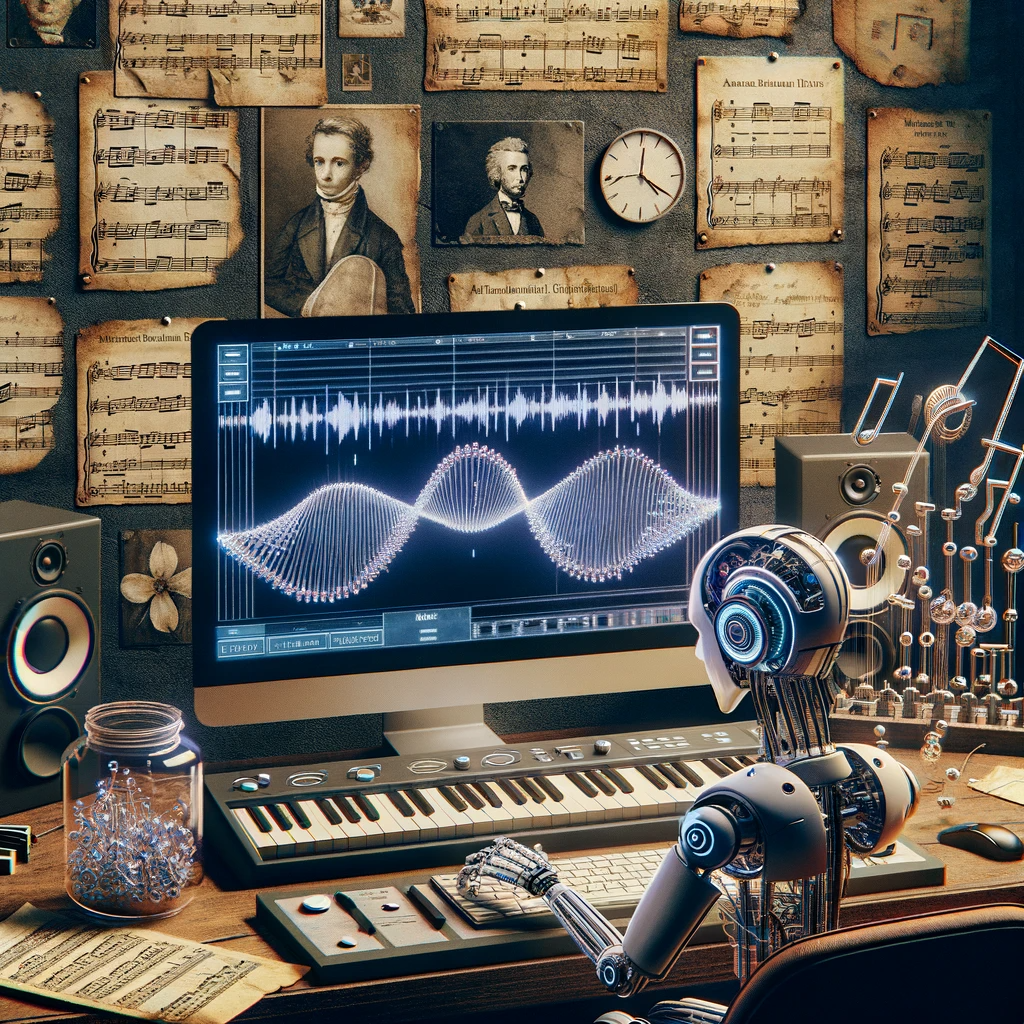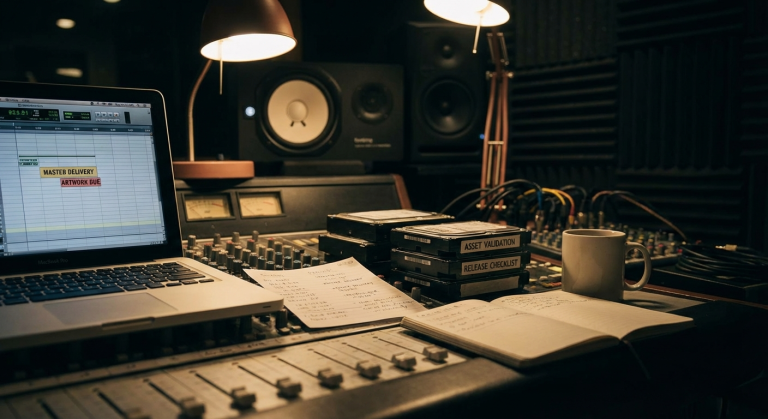Understanding the Basics of AI in Music
The purpose of this section is to provide a brief overview of the fundamental concepts related to AI in music. The topics that will be covered include what AI actually is, how machine learning plays a part, and the use of neural networks in musical composition.
What is Artificial Intelligence?
Artificial Intelligence (AI) refers to a branch of computer science that enables machines to mimic human intelligence. It involves creating algorithms that allow computers to learn from the input they receive, making them capable of performing tasks that would typically require human intelligence. These tasks can range from speech recognition and decision-making to visual perception and even music composition.
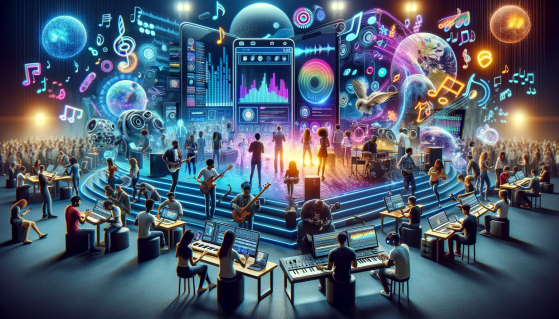
The Role of Machine Learning
Machine learning, a subset of AI, plays a significant role in the development of AI music technology. Machine learning systems can analyze large amounts of data, identify patterns, and generate predictions or decisions without being explicitly programmed to perform the task. In the context of music, these systems can be trained to recognize musical patterns and create new compositions based on these patterns.
Machine learning in music involves feeding the system with a diverse range of music, allowing it to ‘learn’ from the different styles, structures, and elements present. This data then becomes its reference point for creating original compositions.
Neural Networks in Music Composition
Neural networks, another important concept of AI, have a pivotal role in AI-enabled music creation. These are computing systems designed to mimic the human brain’s functionality, consisting of a series of interconnected layers of algorithms, known as neurons.
In a typical neural network for music composition, the first layer (input layer) receives a set of musical notes or an entire score. This data is passed through various hidden layers, each performing an operation on it. The final layer (output layer) then generates a piece of music based on the transformations the data underwent. The beauty of neural networks is that they can be trained repeatedly, improving their music composition capabilities with each training cycle.
After understanding these basic concepts, the vast potential of AI in shaping the future landscape of music becomes apparent. It’s not merely about machines taking over human tasks; it’s about harnessing this technology to enhance creativity and explore new musical horizons.
The Evolution of AI in Music Composition
Artificial Intelligence has dramatically transformed music composition over the years. The path of its evolution has been intricate yet enthralling, illustrating how technology can be blended seamlessly with art and creativity.
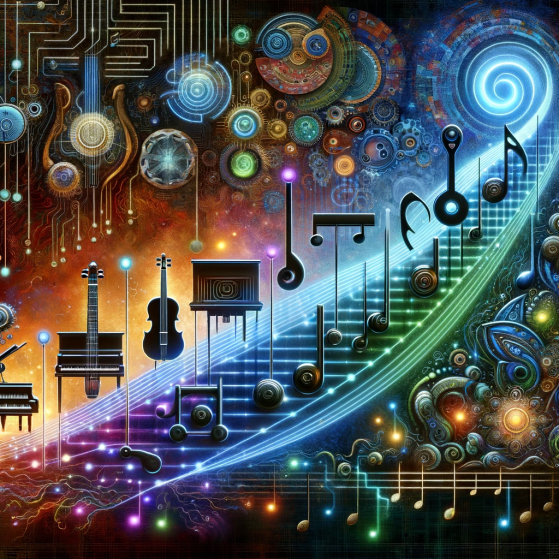
Early Explorations
The journey of AI in music began in the mid-20th century when experiments were conducted with computer-generated music. The Illiac Suite for string quartet, composed in 1957 by Lejaren Hiller and Leonard Isaacson, marks the first substantial use of a computer to compose music. This initial venture kick-started research into algorithmic composition and set the stage for future applications of AI in music.
Emergence of Machine Learning
As machine learning models advanced, AI’s role in music composition began to evolve. David Cope’s ‘Experiments in Musical Intelligence’ (EMI) emerged as an influential project in the late 1980s. Using rule-based AI, EMI could analyze the style of classical composers and create new compositions that imitated their style. The advent of machine learning not only improved the capacity of AI to mimic human composers but also opened the doors to the creation of original pieces by AI systems, making it a relevant tool in the modern music industry.
Current State of AI in Music Composition
Today, AI is more deeply involved in music composition than ever before. Tools such as OpenAI’s MuseNet and Google’s Magenta utilise neural networks to generate pieces ranging from classical symphonies to pop music. These tools don’t just replicate the style of existing artists but also incorporate unique touches, offering unprecedented innovation in the field of music composition. Beyond creating original work, AI has begun revolutionising elements of personalisation in music, capable of crafting pieces to suit the mood and preferences of individual listeners.
Moreover, AI is also venturing into the realm of live performances. Companies like WaveAI’s Alysia are using AI to not only compose songs but also perform them live. This advancement has blurred the lines between traditional human performances and AI-driven creations, making the future of music composition even more exciting.
How AI is Transforming the Process of Music Creation
AI’s Affiliation with Music Composition
Artificial Intelligence (AI) is revolutionizing every field it touches and music is no exception. It has been instrumental in changing the traditional methods of creating music. With AI, musicians can now generate new tunes, create complex musical compositions, and even design unprecedented sounds that previously were not conceivable.
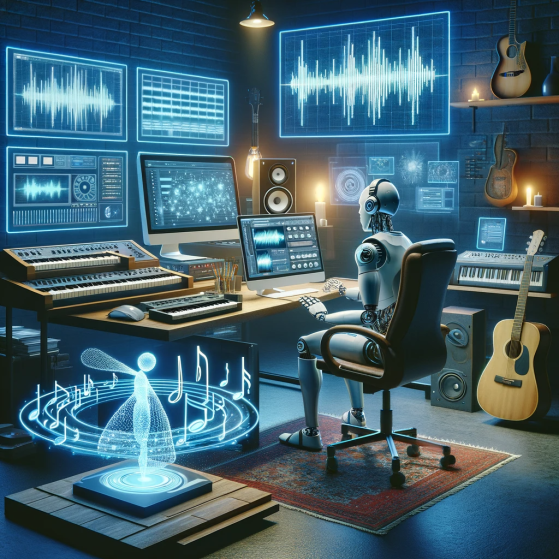
AI is being used to create music in various genres, ranging from classical to heavy metal, and everything in between. It gives musicians a unique tool to experiment with, enabling them to push the boundaries of what is musically possible. Today’s AI algorithms learn by being fed tons of musical data, which they then use to develop new pieces of music that can mirror or even exceed human creativity.
The Technological Grasp on Music Making
Technologies like Machine Learning (ML) and Natural Language Processing (NLP) come into play when we speak of AI in music. Machine Learning algorithms analyze vast amounts of music, learning patterns and structures, to create new melodies and rhythms. For instance, OpenAI’s MuseNet was trained on a dataset containing a wide range of music, enabling it to generate original pieces in many different styles.
On the other hand, Natural Language Processing techniques help in understanding and generating lyrics for songs. Also, Deep Learning networks have proven successful in the automatic transcription of music, converting audio tracks into musical notes. Such capabilities allow musicians to work faster and with more precision, drastically improving their productivity.
AI as a Collaborator, Not a Competitor
While there may be concerns that AI might replace human musicians, it’s important to view AI as a collaborator rather than a competitor. AI doesn’t intend to replace humans but rather augment human creativity. The final output still requires the touch of human musicians for the subtle nuances and emotional connect that machines cannot yet replicate.
AI helps musicians in brainstorming musical ideas and exploring new avenues that they may not have considered earlier. It assists them in elevating their native creativity by providing them an additional set of tools to play with. Musicians across the globe have been using AI to produce unprecedented pieces of music, thus demonstrating how AI can coexist and even flourish with human musicians.
With AI’s assistance, the process of creating music is becoming more dynamic, experimentative, and innovative in ways we could not have imagined before. The future of music holds great promise, with AI set to redefine our understanding and consumption of music.
Noteworthy Examples of AI-Composed Music
AI’s Melodic Mastery: The First AI-composed Album
A historic milestone for AI in music was achieved by Taryn Southern through her album “I AM AI”. Released in 2018, it was the first ever album entirely composed and produced by an artificial intelligence, specifically, Amper Music’s AI. Southern input a genre, mood, and tempo, after which the AI software generated a unique piece of music. A testament to its sophistication, Southern only provided minor tweaks to the compositions, confirming the AI’s remarkable ability to create compelling melodies.
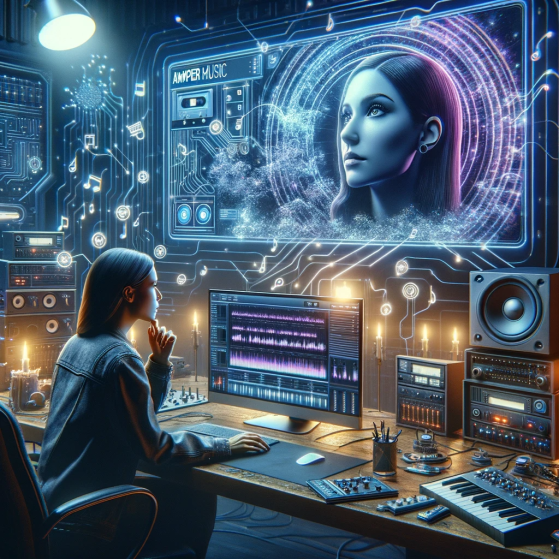
Classical Composition Gets an AI Twist
Another remarkable case is the uncovering of the unfinished Symphony No. 8, also known as Beethoven’s ‘Unfinished Symphony’. A team of AI engineers and musicians used Huawei’s AI model to analyze the timbre, pitch, and meter of Beethoven’s existing works to successfully complete the masterpiece. The final result was a harmonious extension of Beethoven’s original piece, demonstrating the potential of AI in exploring historical styles and tones.
Jukin Media’s AI-composed Soundtracks
Venturing into the realm of film scoring, Jukin Media utilized Jukin’s proprietary AI, Lumen5, to compose soundtracks for its video content. The AI analyzes the video’s narrative, pace, and emotional tone, using these inputs to compose a compatible soundtrack. This not only revolutionizes how film scores are made, but also showcases the personalized, efficient, and cost-effective solutions offered by AI in music composition.
The Advantages of AI in Music Composition
Accelerating the Music Creation Process
One of the primary benefits of AI in music composition is its ability to accelerate the music creation process. Today’s AI algorithms can generate rhythmic and melodic structures in a matter of seconds, providing composers with instant inspiration. What could take hours or even days using traditional methods, can now be achieved almost instantaneously with AI technologies. This increased speed of creation frees up more time for artists to focus on other aspects of their craft, such as lyrics writing or music production.
Crafting Unique Musical Styles
AI also provides the advantage of creating a unique blend of musical styles. By analyzing the elements of different musical genres, artificial intelligence can create innovative compositions that fuse disparate musical traditions into something genuinely new and exciting. This level of flexibility opens up a vast arena of creative possibilities for composers, allowing them to break free from conventional genre limitations and explore new sonic landscapes.
Enabling Non-Musicians to Compose Music
Perhaps one of the most significant advantages of AI in music composition is how it democratizes the process, making it accessible to non-musicians. Through intuitive AI-powered platforms, individuals without formal music training can now compose original music pieces. They simply need to feed certain parameters into the software, such as mood or desired length, and the AI tool does the rest. This has made the beauty of music composition available to a broader audience, thus increasing creativity and participation in the musical arts.
Potential Challenges and Criticisms of AI in Music
Wrestling with Creativity and Originality
One of the main criticisms against the adoption of artificial intelligence in music composition centers around the question of originality. Critics argue that AI, which largely works off patterns and prior data, may not be capable of creating truly novel or innovative music. While AI can learn to mimic styles and genres, reproducing clones of existing compositions, it lacks the human element of instinctive creativity. This could potentially lead to a replication of past musical styles without generating fresh, groundbreaking music.
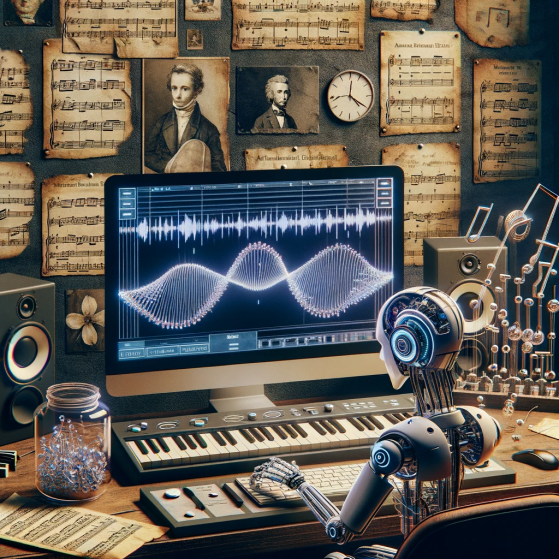
Threat to Human Artists and Employment
Another contentious issue surrounding the deployment of AI in music is its potential impact on human musicians’ employment. AI algorithms are getting increasingly proficient at producing emotionally resonant and commercially viable music. This automation of songwriting and production could potentially lead to job loss for human musicians. Artists, composers, and other music professionals might find themselves forced to compete with AI for creative opportunities, causing significant socio-economic implications.
Ethical and Copyright Concerns
The use of AI in music introduces a new host of ethical and copyright issues. If an AI composes a piece of music based on an analysis of work by a human artist, who owns the rights to that composition? As AI blurs the lines of authorship, determining rightful ownership becomes a complex problem with implications for artists, producers, and the music industry at large. Moreover, the potential misuse of AI to replicate an artist’s style without their consent or to produce deepfakes poses considerable ethical concerns.
Future Projections: The Role of AI in the Music Industry of Tomorrow
Revolutionizing Music Composition with AI
As we move into the future, it’s expected that artificial intelligence will dramatically redefine the process of music creation. By leveraging immense computational power and advanced machine learning algorithms, AI is fully capable of composing entire pieces of music across various genres including classical, pop, rock, and jazz, among others. This doesn’t mean humans will be obsolete in the music-making process, but rather, musicians will have an elevated platform to create music more intuitively and efficiently.
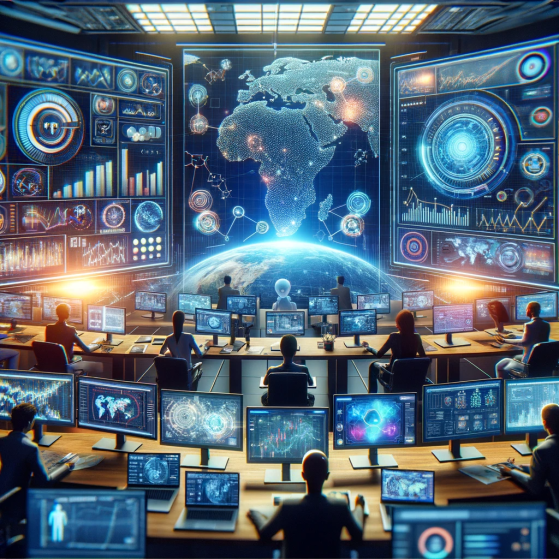
Enhanced Listener Experience through AI
AI has the potential to remarkably transform the way we experience music. With advanced music recommendation systems driven by AI, a listener’s experience could become quite personalized. Imagine listening to a song that adapts itself to your mood, environment, and even heart rate. AI-driven music apps might soon be able to deliver such highly individualized experiences. Moreover, AI technologies like virtual reality (VR) and augmented reality (AR) could lead to immersive concert experiences right from our living rooms.
New Frontiers in Music Marketing and Distribution
The role of AI in the future music scene wouldn’t be limited to just composition or enhanced listening experience. Advanced data analytics powered by AI could revolutionize music marketing strategies, making them more targeted and thus, far more effective. AI could help identify key trends, make accurate sales predictions, and provide valuable insights into consumer behavior. In terms of distribution, AI might automate the process to a level where the right music reaches the right audience at the right time, maximizing reach and revenue.
Thus, the forthcoming era of the music industry promises to be an exciting blend of technology and creativity. With AI taking center stage, we might witness a surge in innovative music styles and enhanced listening experiences, all the while making substantial strides in marketing and distribution methods.

